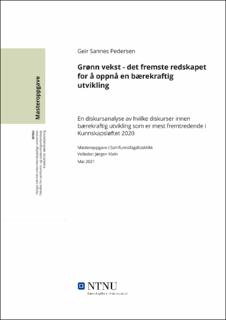| dc.contributor.advisor | Klein, Jørgen | |
| dc.contributor.author | Pedersen, Geir Sannes | |
| dc.date.accessioned | 2021-09-28T17:52:04Z | |
| dc.date.available | 2021-09-28T17:52:04Z | |
| dc.date.issued | 2021 | |
| dc.identifier | no.ntnu:inspera:76470112:14625854 | |
| dc.identifier.uri | https://hdl.handle.net/11250/2785135 | |
| dc.description.abstract | Kunnskapsløftet 2020 har nylig tredd i kraft i norsk skole. Bærekraftig utvikling har blitt et av tre tverrfaglige temaer i fagfornyelsen (Kunnskapsdepartementet, 2017). Bærekraftig utvikling er et komplekst begrep som mange forstår og anvender forskjellig. Dette har ført til debatter om hvordan problemstillingene rundt bærekraftig utvikling skal løses. Læreplanverket vektlegger derfor enkelte aspekter ved bærekraftig utvikling i større grad enn andre, på bakgrunn av diskursene som forfatterne av dokumentet mener er hensiktsmessig. En diskurs er tett forbundet med makt. Denne masteroppgaven belyser hvilke diskurser tilknyttet bærekraftig utvikling som er mest fremtredende i Kunnskapsløftet 2020 gjennom problemstillingen: Hvordan fremstilles og vektlegges begrepet bærekraftig utvikling i Kunnskapsløftet 2020, med særlig fokus på samfunnsfaget og naturfaget? Diskursanalysen har tatt utgangspunkt i overordnet del, og fagplanene i samfunnsfag og naturfag. Forskningen har vektlagt sentrale begreper rundt bærekraftig utvikling i læreplanen. Såkalte nodalpunkter kan fortelle hvilke diskurser som vektlegges ut fra betydningen til nodalpunktene og hvor ofte de anvendes.
Gjennom en tabell som ble utformet på bakgrunn av teoretikere som vektlegger ulike aspekter for å løse utfordringene rundt bærekraftig utvikling ble det dannet tre overordnede diskurser: grønn vekst, nedvekst og ulikhet. Funnene avdekket at det nye læreplanverket i stor grad vektlegger teknologiutvikling og skapende virksomhet for å oppnå en bærekraftig utvikling. Der overordnet del og naturfaget særlig fremmet et ønske om elever som hadde kunnskap om, og kompetanse for utvikling av ny teknologi. Samfunnsfaget fokuserte i større grad på menneskets levesett, og ulikheter med tanke på fordeling av ressurser, makt og byrder. Generelt var diskursen om grønn vekst mest fremtredende i fagfornyelsen ettersom teknologiutvikling og økonomisk vekst samspiller i denne diskursen. Derimot ble også aspekter som kjennetegner nedvekstdiskursen og ulikhetsdiskursen fremmet, særlig innenfor samfunnsfaget. Den kvantitative analysen avslørte i tillegg at samfunnsfaget muligens skal ha mer ansvar for utdanning for bærekraftig utvikling ettersom begrepet bærekraftig utvikling ble anvendt hyppigere i læreplanen for samfunnsfag enn i naturfag.
Analysen avslørte hvilke perspektiver på utdanning for bærekraftig utvikling som skulle vektlegges i styringsdokumentet. Det er hovedsakelig tre perspektiver på utdanning for bærekraftig utvikling: om, for og som. Utdanning om tar for seg kunnskap om tematikken, utdanning for omhandler hovedsakelig kompetanser tilknyttet bærekraftig utvikling, og utdanning som tar for seg hvordan skolens virksomhet og infrastruktur tilrettelegger for bærekraftig utvikling. Hovedfunnene antydet at en utdanning for bærekraftig utvikling er det som skal prege undervisningen i størst grad. Dette gir elevene både kunnskap om bærekraftig utvikling, samt ferdigheter og evner som elevene vil behøve i et samfunn hvor målet er å oppnå en bærekraftig utvikling. | |
| dc.description.abstract | The new curriculum has recently been introduced in Norwegian schools. Sustainable development has become one of three interdisciplinary themes in the renewal (Kunnskapsdepartementet, 2017). Sustainable development is a complex concept that many people understand and use differently. This has led to debates about how the issues around sustainable development should be solved. The curriculum therefore emphasizes certain aspects of sustainable development to a greater extent than others. What the authors of the document believe are appropriate depends on which discourse they identify with. A discourse is closely linked to power. This master thesis illuminates which discourses associated with sustainable development that are most prominent in the new curriculum through the question: How is the concept of sustainable development presented and emphasized in the new national curriculum from 2020, with focus on the subjects social science and nature science? The discourse analysis is based on the core curriculum, and the subjects social science and nature science. The research involves key concepts around sustainable development in the curriculum. So-called nodal points can tell which discourses are emphasized to the greatest extent because the nodal points are mentioned to varying degrees and have different meanings within the discourses.
Three overarching discourses were formed on the basis of theorists who emphasize various aspects around sustainable development: green growth, degrowth and inequality. The findings revealed that the new curriculum greatly emphasizes technology and innovation in order to achieve sustainable development. Where the core curriculum and nature science in particular promoted a desire for students who had knowledge about, and competence for development of new technology. Social science were more focused on lifestyle and differences in terms of distribution of resources, power and burdens. In general, green growth was most prominent in the new curriculum as technology development and economic growth are linked in this discourse. On the other hand, aspects that characterize the degrowth and inequality discourse were also promoted, particularly in social science. The quantitative analysis also revealed that social science may have more responsibility for education for sustainable development as the term sustainable development was used more frequently in the curriculum for social science than in the nature science.
The analysis revealed which perspectives on education for sustainable development that should be emphasized in the document. There are mainly three perspectives on education for sustainable development. Education that deals with knowledge about the topic, education that mainly deals with competencies for sustainable development, and education that deals with how the schools activities and infrastructure facilitate sustainable development. The main findings indicated that an education for sustainable development is what should mainly characterize the teaching. This provides students with both knowledge about sustainable development, as well as skills and abilities that students will need in a society where the goal is to achieve sustainable development. | |
| dc.language | nob | |
| dc.publisher | NTNU | |
| dc.title | Grønn vekst - det fremste redskapet for å oppnå en bærekraftig utvikling | |
| dc.type | Master thesis | |
